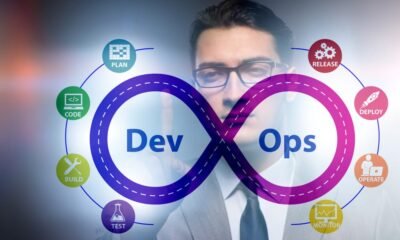Tech
DevOps solutions in app and game development

Introduction
In the intense world of creating software, mobile apps, and games, there’s often a lot of pressure to finish high-quality products quickly. This can lead to what are known as “crunch times,” where people work long hours, give up sleep, and rush to add new features right before a deadline. While this might be common in many companies, it can seriously affect well-being. If you feel stuck in this exhausting routine, consider making changes.
With DevOps solutions, you can shift from chaotic crunches to streamlined, effective workflows. This article explores how adopting DevOps practices enhances user experiences and fosters a healthier work environment for your development team.
The impact of lack of time
Many in the mobile apps & games development are all too familiar with the toll that lack of time takes on creativity and productivity. You might recall nights spent fixing critical bugs, only to find that these quick fixes create a ripple effect of issues that further delay releases. Such cycles are exhausting and can lead to high turnover rates among your talent, which only exacerbates the problem.
As the demand for better graphics, seamless gameplay, and constant updates grows, so does the complexity of game & app development. The latest study showed a staggering return on investment through DevOps practices, measuring saved development time in years rather than hours. Transforming your business from a place of stress to a hub of creativity is essential for both team morale and the end product.
Why embrace DevOps?
The app development environment is changing, and users are expecting more than just a product; they seek a seamless experience. Recovery becomes nearly impossible if your game or app is riddled with bugs at launch.
Incorporating DevOps services and solutions allows you to refine your processes, enhance collaboration, and ultimately deliver better experiences to your players. Here are a few benefits of adopting a DevOps culture:
- Automation: Streamline repetitive tasks so your team can concentrate on more creative aspects of their work.
- Continuous Integration and Deployment (CI/CD): Achieve more frequent delivery of higher-quality content.
- Proactive problem solving: Tackle problems before they become more serious.
- Enhanced team morale: Cultivate a positive workplace atmosphere, prioritizing well-being and productivity.
Essential DevOps practices for game development
Strong version control
Effective version control is critical in managing the vast array of assets involved in app development. A system that is accessible to both technical and non-technical team members can minimize conflicts and lost work.
Build automation (CI/CD)
Implementing a CI/CD pipeline enables teams to merge changes effortlessly and create new builds automatically. This practice ensures that developers can focus on refining their work instead of managing complex pipelines.
Artifact management
Maintaining a centralized repository for all development artifacts — code, assets, dependencies — enhances collaboration and traceability, leading to more predictable builds.
Frequent and automated testing
Incorporating regular testing into your development process helps identify problems sooner, which can lessen their effect on users’ experience of the product. This approach also encourages teamwork, where everyone is responsible for upholding quality standards.
Speeding up mobile development
As mobile applications dominate the market, the need for rapid iterations has never been more pressing. Implementing mobile DevOps practices can significantly enhance your deployment frequency and responsiveness to user feedback. Here’s how:
- Iterative releases: Adopt a rolling deployment strategy that allows you to release updates regularly, keeping your app relevant and engaging.
- UX focus: Since users are less forgiving of poor mobile experiences, thorough pre-production testing and monitoring post-launch are essential for maintaining quality.
- Fragmentation management: With numerous devices and operating systems, leveraging automated testing tools can ensure your app performs well across the board.
Building a collaborative culture
Transitioning to a DevOps mindset demands a cultural shift within the organization, fostering collaboration across project managers, developers, and QA teams to eliminate silos. The development process becomes more efficient and cohesive when these teams align toward shared objectives and maintain open communication. If your team lacks in-house DevOps engineers, working with an IT outstaffing company through a staff augmentation approach offers an effective solution. This option allows you to integrate experienced DevOps talent seamlessly into your team, ensuring your projects benefit from skilled support without the overhead of full-time hires. When everyone works towards common goals and communicates openly the entire development process benefits.
Conclusion
Using DevOps in mobile app and game development reduces stress in critical times and contributes to a better and more productive work environment. DevOps transforms messy workflows into efficient and streamlined ones by automating repetitive tasks, integrating continuous testing, and implementing effective version control. This approach improves the user experience through frequent and higher-quality releases, boosts team performance and motivation, and promotes a collaborative culture prioritizing quality and user satisfaction.
-

 Tech1 year ago
Tech1 year agoHow to Use a Temporary Number for WhatsApp
-

 Business2 years ago
Business2 years agoSepatuindonesia.com | Best Online Store in Indonesia
-

 Social Media2 years ago
Social Media2 years agoThe Best Methods to Download TikTok Videos Using SnapTik
-

 Technology2 years ago
Technology2 years agoTop High Paying Affiliate Programs
-

 Tech12 months ago
Tech12 months agoUnderstanding thejavasea.me Leaks Aio-TLP: A Comprehensive Guide
-

 FOOD1 year ago
FOOD1 year agoHow to Identify Pure Desi Ghee? Ultimate Guidelines for Purchasing Authentic Ghee Online
-

 Instagram3 years ago
Instagram3 years agoFree Instagram Auto Follower Without Login
-

 Instagram3 years ago
Instagram3 years agoFree Instagram Follower Without Login























